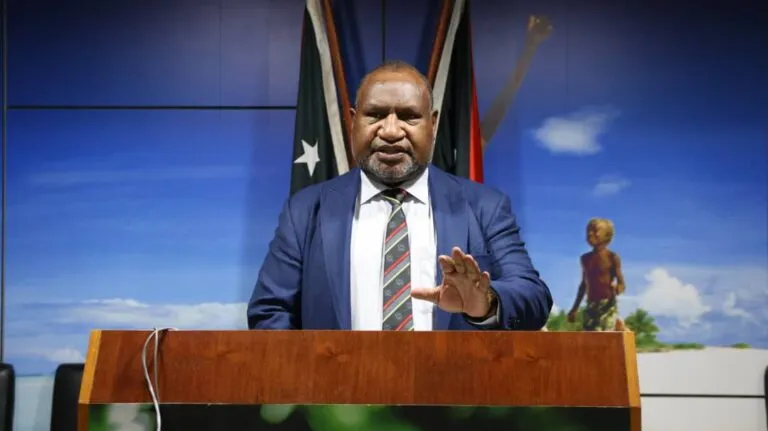As Papua New Guinea marks its 50th year of independence, Prime Minister James Marape has called on farmers, cooperatives, and agribusinesses across the country to seize the rare opportunity presented by soaring global commodity prices—a shift he believes could transform rural economies and deliver lasting prosperity.
With international prices for cocoa and coffee reaching historic highs, combined with a favorable exchange rate, Marape declared that now is the time for PNG’s agricultural sector to rise.
“The global market is sending a clear signal to every farmer in the Highlands, the Islands, Momase, and Southern regions: your time has come,” said Marape. “The world wants the high-quality, organically grown coffee and cocoa that we produce—and they’re willing to pay a premium for it.”
At the start of 2025, Arabica coffee—one of PNG’s main export crops—surpassed USD 4.40 per pound, its highest level in over a decade, driven by poor harvests in major producing countries like Brazil and Vietnam. Cocoa prices also skyrocketed, reaching over USD 12,000 per tonne before settling around USD 8,000—still well above historical averages.
“These price hikes are more than just numbers in financial reports,” Marape said. “They represent tangible opportunities rooted in every cocoa pod and coffee cherry our farmers harvest.”
Currency Advantage Further Boosts Export Value
Adding to the advantage is PNG’s current exchange rate, where 1 USD equals approximately 4.13 kina—making every export dollar more valuable in local currency terms.
“Our farmers now receive more kina per exported dollar,” Marape emphasized. “This directly lifts household income, stimulates local commerce, and drives national economic growth.”
Turning the Boom Into Real Gains: Government Support Measures
To ensure that farmers can capitalize on this market boom, the Prime Minister detailed a range of government-backed initiatives:
1. PACD Agricultural Investment Project
The PNG Agriculture Commercialization and Diversification (PACD) project, co-financed by the World Bank and the PNG Government, is investing in rural infrastructure including processing facilities, feeder roads, nurseries, and farming tools. Key beneficiary provinces include Jiwaka, Western Highlands, Chimbu, Morobe, East Sepik, and East New Britain.
2. National Agricultural Credit Scheme
To address financing gaps, the government is preparing to launch a national credit scheme offering low-interest loans to farmers and SMEs for equipment purchases, production expansion, and meeting export standards.
3. Export Channel and Market Access Support
Agencies like the Coffee Industry Corporation (CICL) and Cocoa Board of PNG are working to streamline certification processes, facilitate cooperative exports, and connect producers with direct international buyers.
4. Branding and Value Addition
Marape highlighted the importance of branding and value-added products, such as honey-processed coffee and single-origin specialty cocoa.
“Our crops grow in pristine environments, nurtured by hardworking hands using traditional methods. These are exactly the attributes that premium global markets value,” he said. “We must position PNG as a trusted origin of excellence.”
Agriculture: A Pathway to Inclusive Growth
The Prime Minister reiterated that agriculture remains the most inclusive pathway to nationwide development.
“Our country’s gold isn’t only found underground—it’s also in our gardens,” Marape said. “This is how we build a resilient, self-sufficient economy where wealth is shared widely, not concentrated.”
Quoting the Book of Genesis 2:15, he emphasized the sacred role of agriculture:
“When God placed Adam in Eden, He instructed him to ‘work and take care of it.’ This tells us that land is life. If one million households shift from subsistence to market-oriented agriculture—growing coffee and cocoa for export—we will earn real foreign income and radically transform our rural economy.”
Aligning Agricultural Gains with Social Policy
Marape noted that increased farm incomes now complement major social policies.
“We’ve removed the burden of school fees through free education, and we’re investing in healthcare. These were among the biggest household expenses. Now, every kina earned through farming is true savings—money for better food, housing, and futures.”
Inspiring Examples and the Road Ahead
The Prime Minister cited the Koremane Coffee Project in Jiwaka and the Cocoa Revitalisation Program in East Sepik as proof that coordinated investment and commitment lead to success.
“As we celebrate 50 years of independence, let us not just reflect on the past, but also look forward to the future,” he said.
“Let 2025 be the year we revive agriculture. Let this be the moment we empower farmers, feed our nation, and serve the world. We are not merely commodity suppliers—we are exporters, entrepreneurs, and custodians of this great land.”


